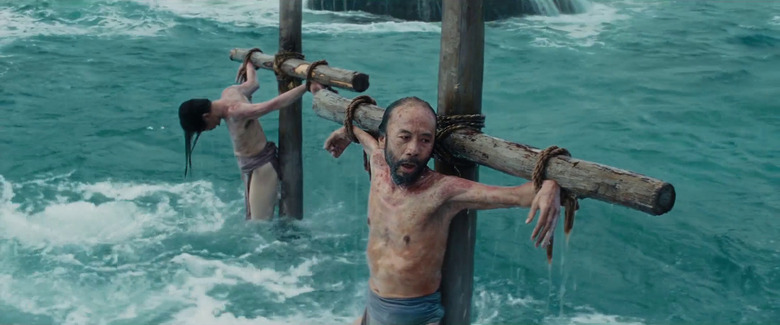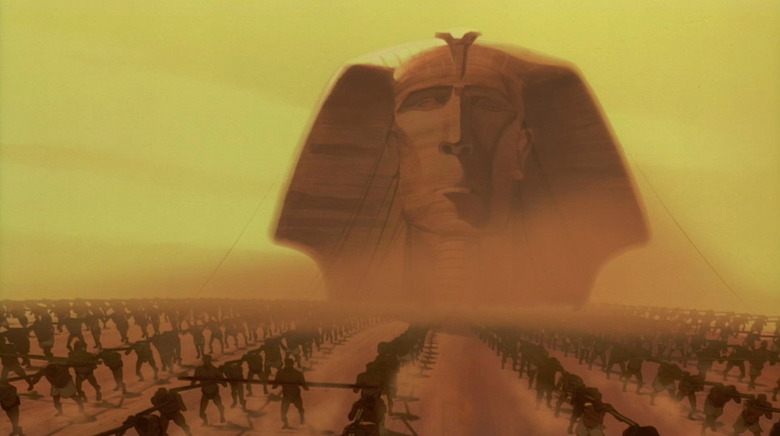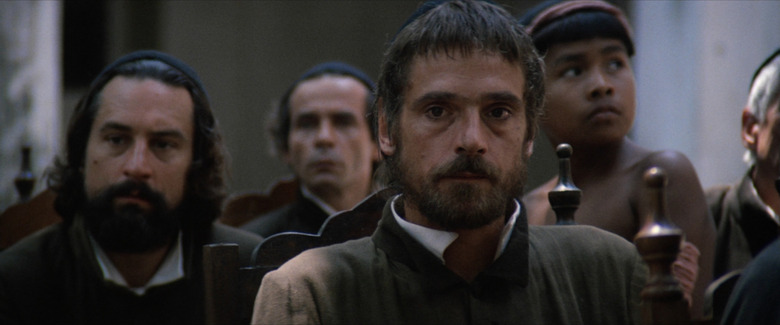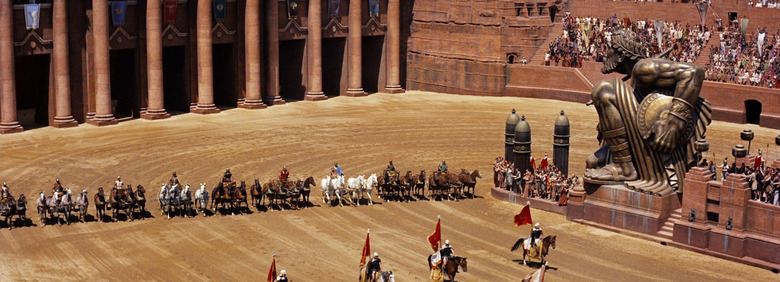The Problem With Faith-Based Movies And Four Religious Films That Give The Genre A Good Name
The weekend before last, a seemingly under-the-radar film called I Can Only Imagine wound up being a surprise box office hit. It was the first in a string of faith-based movies set to roll out in the weeks leading up to Easter. Paul, Apostle of Christ, a biblical drama starring Jim Caviezel, opened last Friday, and a second sequel to the 2014 hit God's Not Dead sees release this week.
Caviezel, of course, played Jesus in Mel Gibson's The Passion of the Christ, and that movie is a prime example of how religious films are often underestimated when it comes to commercial success. Made on modest budgets, these movies have built-in support from an underserved niche of filmgoers who find their beliefs at odds with the pool of available viewing content. Local churches embrace the films in grass-roots campaigns, and it doesn't hurt if they have ties to a bestselling Christian music single or self-help book. This is how I Can Only Imagine was able to win the weekend over Disney's A Wrinkle in Time, a movie that deliberately downplayed the Christian elements of its source material.
By now, there are enough titles out there that religious films have gotten to be a genre in and of themselves. Yet they almost always seem to be under a quality curse, much like video game movies. Those that aren't outright bad tend to be mediocre. Why are so many faith-based movies subpar? And what movies actually get this right?
Preaching to the Choir
The term "faith-based movie" denotes a modern breed of religious film that strives to be inspirational while remaining grounded in its own social values. The term itself reveals that the storytelling in these movies, their every narrative decision, proceeds from a foundation of unwavering religious conviction. If you are a person who doesn't happen to share that same faith base, you're liable to be put off.
With the two previous installments in the God's Not Dead series earning 15% and 9% scores on the Tomatometer, respectively, it's easy to imagine God's Not Dead: A Light in Darkness earning a snarky Rotten Tomatoes blurb like, "God may not be dead ... but this movie is dead on arrival."
Secular audiences are not usually the target for these movies, anyway. Some might deliver a comforting message to established believers, but they seem less designed to resonate widely or forge an empathic link with any outsiders. What you often get with faith-based movies are stories that resound as hollow and didactic, as if told in an echo chamber. The merits of pure artistry, art for art's sake, are sacrificed in favor of platitudes, leaving the movies to suffer derision for their cinematic shortcomings.
Outside the faith-based sub-genre, religious films may be starting to show signs of maturity. It's not just Caviezel and Joseph Fiennes (Luther, Risen) who star in these movies anymore. Stacked with recognizable actors who don't feel like they're slumming, films like Captive and Last Days in the Desert make gains toward a higher class of Christian movie.
By virtue of their period setting, which immediately displaces the viewer to an alien time, historical religious films tend to be more accessible to the uninitiated. The list below contains no straight-up Jesus biopics, only because it's a starter pack and the two best Jesus-focused movies each carry a different stigma. Martin Scorsese's The Last Temptation of Christ was highly controversial in its day and its central metaphor of Jesus as a flawed human might still be difficult for some religious viewers to accept. The Passion of the Christ is like a painting come to life, but it, too, was mired in (well-deserved) controversy in a way that overshadowed its artistic merits.
Personally, I've always had a soft spot for Jesus Christ Superstar.
Silence (2016)
When it comes to filmmaking, Martin Scorsese is perhaps the most highly respected master of the craft working today. If anything, Silence is a reverse crossover, reaching across the aisle to religious viewers from the mainstream, where it already sits well-regarded. With Scorsese being a pre-seminary drop-out (like yours truly) whose last film before this was The Wolf of Wall Street (The New York Times called him "a grandmaster of the profane"), staunch conservatives are likely to see the director himself as an apostate, much like the film's main character, Rodriguez. Yet that only plays into the text of the film, where the issue of what it means to hold to an ideal or betray one's beliefs is front and center.
Rodriguez is a Jesuit priest who ventures into Japan at a time when the country's "hidden Christians" are under persecution. He soon finds himself in an impossible situation where he must choose to forsake his God and everything he believes in or else condemn others to death. There's a question of vanity: Rodriguez brings Western hubris, a white-savior mentality, to a land that is largely indifferent toward his God but in some ways seems to have instilled a truer spirit of self-sacrifice into its people, such that they embody the very suffering servant that Jesus was supposed to be.
Rodriguez becomes both a Christ figure and Judas figure. Scorsese's adaptation lacks the ambiguous ending of Shusaku Endo's novel, not to mention the book's ability to let the writing form itself peel back layers of truth and self-deception surrounding the character, as it shifts from his first-person perspective to third-person narration and eventually a coldly objective record of facts.
The film is still deeply thought-provoking, however, and it does something few faith-based movies seem capable of: it confronts believers, putting them outside their comfort zone in the sandals of the proverbial stranger in a strange land. Good drama challenges and changes its characters and audience; it's not risk-adverse and so convinced of its own viewpoint that it settles into self-satisfied sermonizing.
The Prince of Egypt (1998)
Forget about Exodus: Gods and Kings, director Ridley Scott's willfully whitewashed attempt at recapturing the lost glory of Cecil B. DeMille epics. The Prince of Egypt is the better Moses movie. This film came at the earliest inception of Dreamworks Animation. Years before delivering Shrek and Kung Fu Panda, the fledgling animation studio entered a marketplace dominated by Pixar and late-period Disney Renaissance films.
Dreamworks had to bring its A-game in order to compete and that's what faith-based movies need to do if they ever want to reach anyone outside their hermetic bubble. The Prince of Egypt boasts an all-star voice cast (seriously, look at the names); it's got a score by Hans Zimmer, a duet by Whitney Houston and Mariah Carey, and musical numbers like the beautiful, haunting "River Lullaby" (performed by co-director Brenda Chapman in the movie and by Amy Grant on the soundtrack release).
The film's animation is also quite beautiful to behold. As cinematic moments go, it's hard to match the parting of the Red Sea in the 1956 version of The Ten Commandments. In The Prince of Egypt, however, there is a moment when the Israelites are filing past a wall of water and lightning illuminates it so that we can see a majestic humpback whale silhouette swimming alongside them. Zimmer's musical cue for the presence of God, first heard during the movie's burning bush scene, plays again during this moment. The synergy between music and imagery gives the scene a different kind of grandeur in which the sacred can truly be felt. More religious films should aspire to that.
The Mission (1986)
Winner of the Palme d'Or at the Cannes Film Festival, The Mission was also nominated for Best Picture and Director and won Best Cinematography at the Academy Awards. The film begins as a man tied to a cross is sent floating downriver to where he goes plunging over the side of a waterfall. It's an arresting image in a movie whose visual splendor is augmented by one of legendary composer Ennio Morricone's very best film scores. The movie itself can be forgiven for losing to a powerhouse like Oliver Stone's Platoon, but that Morricone score is another classic entry in the pantheon of all-time great Oscar nominees that should have won.
Between The Mission and Silence, Jesuit missionaries and Liam Neeson seem to be ingredients for a good recipe when it comes to historical religious films. (Neeson also voiced the allegorical Christ-lion Aslan in The Chronicles of Narnia: The Lion, Witch, and the Wardrobe.) Here the setting is the South American jungle instead of Japan. Jeremy Irons plays Father Gabriel, a priest whose heavenly oboe tunes manage to gain him acceptance among the local Guaraní people. Robert De Niro plays Mendoza, a slave trader who kidnaps those same people until an even worse crime causes him to seek penance.
Penance involves him dragging a net full of mercenary armor, all the sins of his past life, up the side of the falls. It's a powerful redemption scene, and the film itself goes hurtling toward a powerful conclusion when the titular mission comes under threat from colonialists. Mendoza and Father Gabriel have opposing philosophies about how to deal with the threat: should they come out to meet it like the Old Testament God of justice or the New Testament God of love? Faith-based movies could learn a lesson from how The Mission embeds its themes in an affecting story instead of trying to build the story around empty propaganda.
Ben-Hur (1959)
Never mind the poorly reviewed 2016 remake (which was actually the remake of a remake). The Charlton Heston version of Ben-Hur was one of the greatest motion pictures of its day, a widescreen epic with a cast of thousands. The film swept the Academy Awards and has a long list of other accolades to its name. Its climactic chariot race remains a benchmark for action sequences, while its story of a prince turned galley slave who seeks to avenge himself and reclaim his family's honor laid the template for films like Gladiator.
Portraying the figure of Christ on celluloid is a tricky thing. Some of the most well-known Jesus biopics have chosen to focus primarily on his human side, ignoring supernatural aspects of the biblical narrative like the demon exorcisms, walking on water, and resurrection story. It's not always easy to make your main character relatable when he's, you know, the Son of God. The character of Superman, whose mythic origin and godlike powers have seen him portrayed as a Christ figure on screen, faces a similar problem. Ben-Hur subverts the problem by depicting Jesus through the eyes of a mortal man, showing how the divine intersects with the life of that man.
It's unfortunate that Heston, an Episcopalian, would become the face of the NRA in his later years. Some people probably remember him more now for his appearance in the 2002 Michael Moore documentary Bowling for Columbine. Yet maybe there's a lesson there insofar as it shows how the living example of believers themselves can be as much of a turn-off as their art sometimes.
Before trying to play spiritual doctor to the masses, maybe the makers of faith-based movies should have a good long look at themselves and their creative projects, taking to heart that old line of scripture: "Physician, heal thyself." The next step maybe would be to hire a good script doctor.




